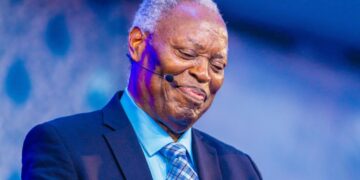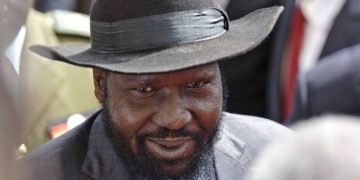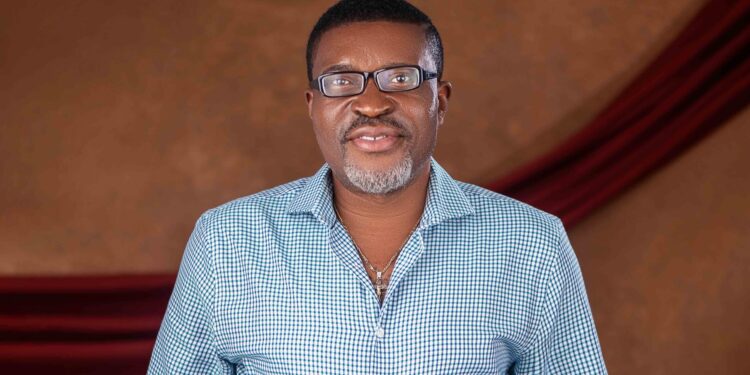In “Living in Bondage,” Nigeria’s first home video, Chief Omego walks into a supermarket to meet Merit (played by Nnenna Nwabueze) and Andy (Kenneth Okonkwo)’s wife. Even though he is inside the supermarket, he is easily noticeable. Compared to the others in the supermarket, he wears dark aviator shades and a bespoke suit. As he consoles Merit for losing her job, you can tell that Chief is a proud man who believes that wealth is his right and must be displayed. He doesn’t fail to mention that he has just returned from London, and feels the need to remind her that “I’m known for money as you know.”
Nigerians would see Chief Omego in several scenes with an ostentatious display of wealth. His role would also fuel and validate Nigerians’ suspicion on the display of illegal and sudden wealth by some of the high-rising men in society. Nigerians would also identify Kanayo O. Kanayo (real name Anayo Modestus Onyekwere) as Chief Omego for years.
While Nigerians were captured by the strong personality that is Kanayo, what many do not know is that his journey to becoming a top television personality started after he graduated from secondary school in 1982. His search for a white-collar job saw him go to NTA Aba where he became an instant favourite. He would move to NTA Enugu and then, ABS TV (Anambra Broadcasting Service). Luck shined on him when, after his role in “Checkmate” [a popular soap opera in the 90s] by Amaka Igwe, he was called for an audition. It is his successful role that would propel him to who he is today.
But with “Living in Bondage’s” success, it would appear that emerging producers would focus on more films with the “Living in Bondage” narrative: money-making rituals, and voodoo.
He argues that the projections in those films are a representation of the reality of Nigerians. “What we are showing in Nollywood is social realism. We tend to make our films as realistic as it is in our environment. The problem now is the propensity with which we do it and that propensity is because the market forces determine their profitability.
Speaking further on the stereotype of Africa, he opined that people need to understand that not all things Africa is bad. He said that before the coming of the Westerners, Africa enjoyed a certain level of peace and was guided by its values. He also noted that the reason for the projection in many films is because “there are certain things that are exaggerated in the African culture for film and this is because there is not enough research on the values of Africans before the coming of the white man.”
“If you look for the trouble of an American, he pulls the trigger [or goes to a lawyer]. But if you look for the trouble of a Nigerian, he looks for a native doctor. That is who we are. Do you hear of those things in America? We read and hear that people are using things to make money. If we take this story and produce a film based on this, they would say, ‘Nollywood has started again. How is this even possible?’ These are social realistic things we do as part of Nollywood. Once we change our systems of living and what we, as a people, are doing to make money, we will stop.”
As is the inability of Nigerians to differentiate reality from the characters, there have been speculations and arguments that if people can play certain characters effortlessly [in his case, blood rituals and voodoo], it is because the roles are a representation of their real lives. “In my capacity as an actor, I have been cast for these roles. Maybe, just maybe, because I play them well. Whenever you play a role and people can pin your name to the role, you’ve played it well,” he said.
In June 2020, Kanayo also known as KOK, participated in the “Don’t Leave Me ” Challenge, a play on words global challenge started by The Guardian Life’s one-time cover feature, Josh2Funny. Rather than enjoy his participation, some Nigerians took to social media to troll him on being a ritualist. It did not matter that Nigerians are also familiar with his role as Professor Johnbull in a comedy series. Responding to this, Kanayo took to his Instagram account to say in part, “We are doing something about this Don’t Leave Me challenge, so all of you talking about rituals…I played a role, but the fact is, some people don’t contribute anything to followership, all they want to do is cause distraction.”
The Passionate Actor
With fame comes power and sometimes wealth but fame is not a guarantee that wealth is imminent. He opined that while the pursuit of wealth is valid, rather than focus on the wealth and the many promises of fame, a lot of actors are in pursuit of “intellectual fulfilment.” At a time when his career wasn’t making ends meet, he had to “suspend” television and concentrate on trading. “And the reality stares you in the face when you have to pay your child’s school fees. It is then you would realise that you are making people happy but may go home sad,” he continued.
Citing the Asaba Nollywood film industry, he says with a hint of sadness that actors are earning less than a few years ago. “About 10 years ago, if you starred in a film, it was good enough. And if you play two roles in a month, there was something to keep. But now, people feature in films for free. It is not a good scenario at all and it is not encouraging. I commend my colleagues who are playing their part, but I know that this is not the Nollywood we should be building.”
Nigeria’s Call Obey
Having established himself as a veteran in Nollywood, Kanayo decided to extend this service to national development to the political terrain in 2018, his second time running. In June 2018, he announced via his Instagram that he was ready to serve his constituency as House of Representative for Ahiazu/ Ezinihitte Mbaise Federal Constituency, in Imo State under the aegis of All Progressive Grand Alliance (APGA).
He tells The Guardian Life that his driving force was service to man. While service to man is regarded as one of the highest selfless acts, those who have come from the entertainment industry in Nigeria have always had to defend the reason for running for political office. Indeed, an entertainer’s ability to take such office seriously is a conversation- starter in some circles. However, Kanayo says that in this, his run was auspicious, despite not winning the elections due to the flaws of the electoral system.
“I never had anyone discriminate against me because I am an actor. I have been given a fair opportunity. Most people in my constituency know that I am a credible candidate but in Nigeria, credibility does not win you elections. But in terms of the contest, Nigeria’s electoral process is no longer about the credible candidate, it is about how much money can you bring? And this cannot augur well for our country.”
New Horizons
With five (5) academic certifications; diplomas in mass communication and law, degrees in philosophy and political science and his most recent, a law degree, the 58-year-old has become a source of inspiration to many. Beyond this achievement, he sees himself as “a servant in the service of justice.”
While he may not have gotten into the House of Representatives, he is definitely looking forward to serving in the legal profession.
“I am a man who is looking to serve his community and my community here is to my state and Nigeria as well as contribute to national development, youth development. With my contribution to the entertainment industry, I will now try to marry law with entertainment and see what we can bring out of it.”
With this new achievement comes a slight change in his career path. Now a lawyer, the rules of Professional Conduct for Legal Practitioners will affect how much fans will see him onscreen. According to Rule 7 (1) titled “Engagement in business”, Unless permitted by the General Council of the Bar (hereinafter referred to as the “Bar Council”), a lawyer shall not practice as a legal practitioner at the same time as he practices any other profession.
Perhaps, it is why Falz, RMD and Femi Adebayo have not been actively involved in the legal profession.
As such, he must devise new strategies to continue to serve the entertainment industry. “It is now left for me to build a new level for myself where I am not supposed to be showing myself on TV always, but it does not stop me from producing programmes for the entertainment industry. It is an opportunity for me to think about the new normal between entertainment and law.”





































